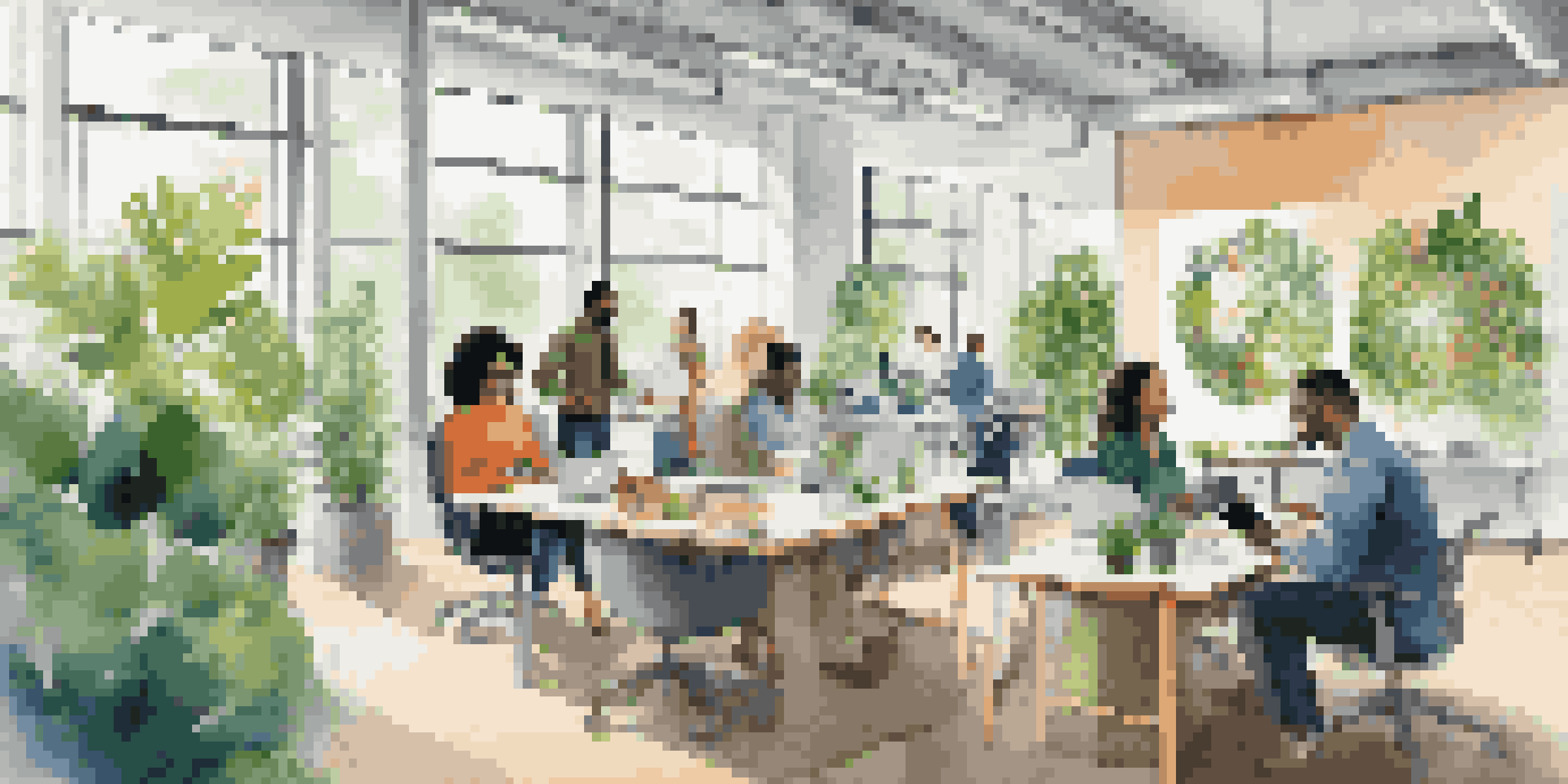Future-Proofing Your Career: Skills for a Sustainable World

Understanding the Importance of Sustainability Skills
In today's rapidly changing job market, sustainability skills are becoming crucial for long-term career success. As industries evolve to prioritize environmental responsibility, professionals must adapt accordingly. This means embracing a mindset that values not just profit, but also people and the planet.
Sustainability is no longer about doing less harm. It's about doing more good.
Imagine a world where every decision made in the workplace considers its environmental impact. This shift is not just a trend; it's becoming the standard. By prioritizing sustainability, you position yourself as a forward-thinking candidate who can navigate these changes effectively.
Ultimately, understanding the importance of sustainability skills can set you apart in a crowded job market. Employers are increasingly seeking individuals who can contribute to their sustainability goals, making these skills invaluable for future-proofing your career.
Critical Thinking: A Skill for Sustainable Decision-Making
Critical thinking involves analyzing situations and making informed decisions, which is essential in a world that demands sustainable practices. This skill allows you to evaluate the implications of your choices, whether in business strategies or daily operations. For instance, considering the environmental impact of sourcing materials can lead to more sustainable options.

By honing your critical thinking abilities, you can approach problems with a broader perspective. This means not only identifying immediate solutions but also considering long-term outcomes. It’s like being a detective, piecing together clues to solve a larger puzzle.
Sustainability Skills for Careers
Embracing sustainability skills is vital for standing out in a competitive job market.
Incorporating critical thinking into your skill set can enhance your career prospects significantly. Employers value individuals who can think strategically about sustainability and contribute to innovative solutions.
Embracing Digital Literacy for a Sustainable Future
In our increasingly digital world, being digitally literate is no longer optional—it's essential. This skill encompasses everything from basic computer proficiency to understanding data analytics and digital communication tools. As businesses adopt technology to enhance sustainability, digital literacy becomes a key asset.
The greatest threat to our planet is the belief that someone else will save it.
Think of digital literacy as the compass that guides you through the vast sea of information. It enables you to navigate tools and platforms that can help track sustainability metrics, manage resources efficiently, and communicate effectively with diverse teams.
By investing in your digital skills, you not only boost your employability but also position yourself as a contributor to sustainable practices in your organization. This skill is vital for anyone looking to thrive in future workplaces.
Collaboration: The Heart of Sustainable Innovation
Collaboration is essential for driving sustainable innovation. Working with diverse teams allows you to pool different perspectives and ideas, leading to more creative solutions. Imagine a group of professionals from various fields coming together to tackle a complex environmental issue—this synergy can spark groundbreaking initiatives.
Effective collaboration requires strong interpersonal skills, including communication and empathy. By fostering these skills, you create an environment where everyone feels valued and motivated to contribute. This not only enhances team dynamics but also leads to more sustainable outcomes.
Critical Thinking Drives Innovation
Developing critical thinking enhances decision-making and fosters sustainable practices in business.
In a world where problems are interconnected, collaboration is your superpower. Embracing this skill can help you lead projects that prioritize sustainability and make a meaningful impact.
Adaptability: Navigating Change in a Sustainable Landscape
Adaptability is the ability to adjust to new conditions, and it's more important than ever in our fast-paced world. As industries shift towards sustainability, professionals must be willing to embrace change and learn new skills. Think of adaptability as the ability to dance to a new rhythm, allowing you to keep up with evolving trends.
This skill involves not just accepting change but actively seeking opportunities within it. By being open to new ideas and approaches, you can contribute to innovative solutions that align with sustainable practices. It's about being proactive rather than reactive.
Incorporating adaptability into your career toolkit ensures that you remain relevant and competitive. The more flexible you are, the better equipped you'll be to navigate the complexities of a sustainable future.
Emotional Intelligence: Building Sustainable Relationships
Emotional intelligence (EI) is the ability to understand and manage your emotions and those of others. This skill is crucial in fostering strong relationships, especially in collaborative environments focused on sustainability. Imagine being the glue that holds a diverse team together, promoting harmony and cooperation.
With high emotional intelligence, you can navigate conflicts, inspire others, and create a supportive workplace culture. This is particularly important in sustainability initiatives, where people from different backgrounds must work together towards a common goal. It's about connecting on a human level.
Lifelong Learning is Essential
Committing to lifelong learning keeps you relevant and adaptable in the ever-evolving landscape of sustainability.
By developing your emotional intelligence, you enhance your ability to lead and influence others positively. This skill not only benefits your career but also contributes to a more sustainable and empathetic workplace.
Lifelong Learning: Staying Ahead in Sustainability
In a world where change is constant, committing to lifelong learning is essential for career sustainability. This means continuously updating your skills and knowledge to keep pace with emerging trends in sustainability. Picture yourself as a lifelong student, always curious and eager to learn more.
Embracing lifelong learning allows you to stay relevant in your field and adapt to new technologies and practices. Whether it's taking online courses, attending workshops, or reading industry publications, each step contributes to your growth. It's about being proactive in your professional development.

Ultimately, the commitment to lifelong learning empowers you to take charge of your career. This mindset not only enhances your skill set but also positions you as a leader in the pursuit of sustainable practices.